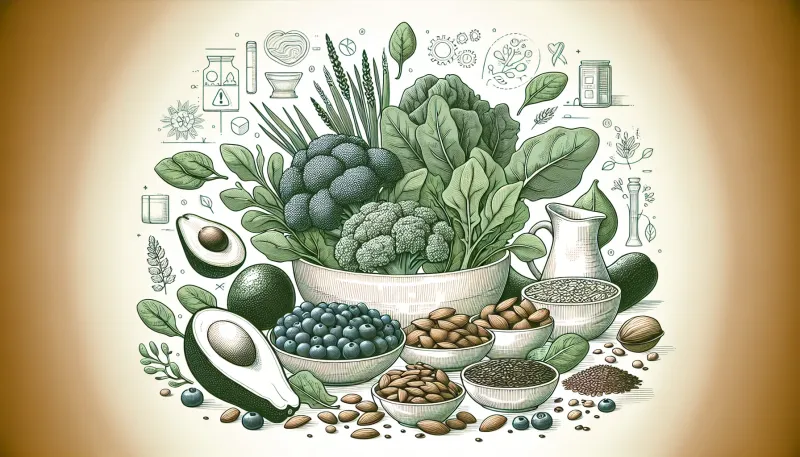Best Fiber-rich Foods for Reducing Inflammation Naturally

Discover the best fiber-rich foods for reducing inflammation naturally, and how they can improve your overall health. Learn more in our comprehensive guide.
Inflammation is a natural process that helps your body heal and defend itself from harm. However, when inflammation becomes chronic, it can contribute to various health issues, including heart disease, arthritis, and diabetes. One way to manage inflammation is through diet – particularly by incorporating fiber-rich foods. In this article, we'll explore the best fiber-rich foods for reducing inflammation naturally and how they can support your overall health.
Understanding Inflammation and its Causes
Before diving into specific foods, it's important to understand what inflammation is and what causes it. Inflammation is part of the body's immune response, but chronic inflammation can be triggered by a poor diet, lack of exercise, stress, and exposure to toxins. Chronic inflammation is harmful as it can damage tissues and organs over time.
The Role of Fiber in Reducing Inflammation
Dietary fiber, which is found in fruits, vegetables, whole grains, and legumes, can play a crucial role in reducing inflammation. Fiber helps to lower cholesterol levels, stabilize blood sugar, improve bowel movements, and support a healthy gut microbiome – all of which can contribute to reducing overall inflammation in the body.
Top Fiber-rich Foods for Inflammation
1. Oats
Oats are an excellent source of soluble fiber known as beta-glucan. This type of fiber has been shown to have anti-inflammatory properties and can help lower cholesterol levels. Adding a bowl of oatmeal to your daily diet can be a simple way to increase your fiber intake and combat inflammation.
2. Berries
Berries such as strawberries, blueberries, raspberries, and blackberries are high in fiber, vitamins, and antioxidants. These nutrients work together to protect your cells from inflammation and oxidative stress. Including a variety of berries in your diet can provide substantial anti-inflammatory benefits.
3. Legumes
Legumes including beans, lentils, and peas are packed with fiber and plant-based proteins. They are also low in fat and can help reduce C-reactive protein (CRP) levels in the blood, a marker of inflammation. Regular consumption of legumes can hence assist in managing inflammation effectively.
4. Whole Grains
Whole grains such as brown rice, quinoa, barley, and whole wheat are rich in fiber and essential nutrients. Unlike refined grains, they help to regulate blood sugar levels and have largely anti-inflammatory properties. A diet with a high proportion of whole grains can mitigate chronic inflammation in the body.
5. Leafy Greens
Leafy greens like spinach, kale, and Swiss chard are excellent sources of both fiber and antioxidants. These vegetables help to combat inflammation by neutralizing free radicals and preventing oxidative stress. Incorporating a variety of leafy greens into your meals can enhance your body’s defense against inflammation.
6. Nuts and Seeds
Almonds, walnuts, chia seeds, and flaxseeds are great for adding both fiber and healthy fats to your diet. The omega-3 fatty acids found in many nuts and seeds are particularly beneficial for fighting inflammation. Regularly snacking on nuts and adding seeds to your salads or smoothies can support overall inflammation reduction.
7. Apples
Apples are another fantastic source of dietary fiber, particularly pectin, which can aid in reducing inflammation. The antioxidants present in apples also help to combat oxidative stress. Eating apples with their skin can maximize their fiber content and health benefits.
8. Carrots
Carrots are rich in beta-carotene, a powerful antioxidant that the body converts into vitamin A. This nutrient, in conjunction with the fiber in carrots, helps reduce inflammation and strengthens the immune system. Enjoy carrots in salads, soups, or as a healthy snack.
9. Flaxseeds
Flaxseeds are a superb source of both soluble and insoluble fiber, and they have a high content of anti-inflammatory omega-3 fatty acids. Ground flaxseeds can be easily added to smoothies, cereals, and baked goods for a fiber boost that helps manage inflammation.
Incorporating Fiber-rich Foods into Your Diet
Adding more fiber-rich foods for inflammation into your diet doesn't have to be difficult. Here are some practical tips to help you increase your intake of these beneficial foods:
- Start your day with fiber: Opt for breakfast options like oatmeal topped with berries, chia pudding, or whole grain toast with avocado.
- Snack smart: Choose fiber-rich snacks such as raw veggies with hummus, a handful of nuts, or apple slices with almond butter.
- Include fiber in every meal: Add legumes to soups, salads, and stews; incorporate whole grains as a side dish; and fill half your plate with vegetables.
- Experiment with new recipes: Try out recipes that feature fiber-rich foods like quinoa salad, lentil soup, or a mixed berry smoothie.
Conclusion
Chronic inflammation can significantly impact your health and well-being, but dietary choices can make a big difference. By incorporating fiber-rich foods for inflammation into your daily meals, you can naturally reduce inflammation and support your overall health. Remember, achieving and maintaining a healthy diet is a long-term journey, so make gradual changes and enjoy the process of discovering new fiber-rich foods and recipes that help you feel your best.



























